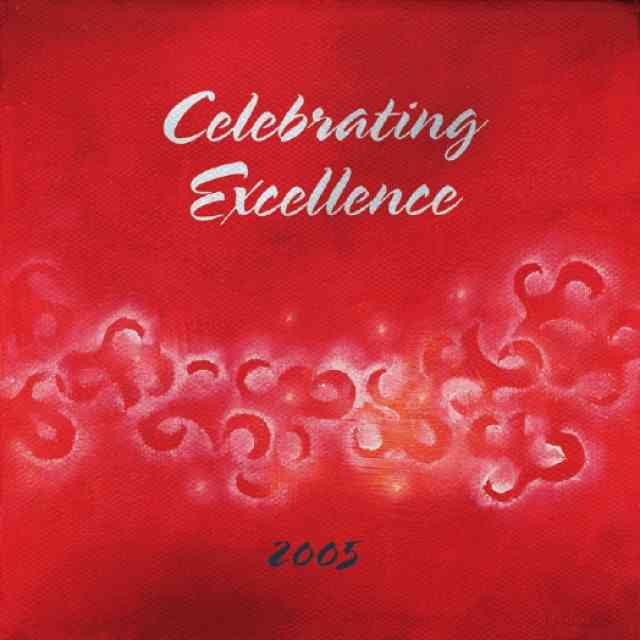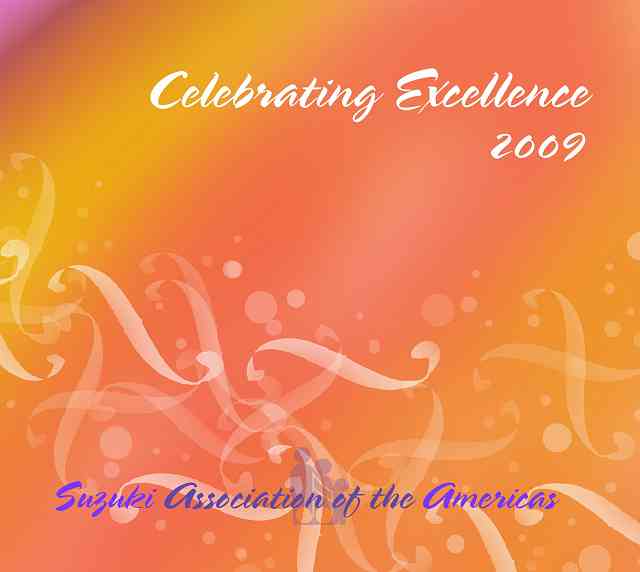
Celebrating Excellence 2009 features musicians who began their careers as Suzuki students. This year’s collection features 11 performances—solos and ensembles—including violin, viola, cello, piano, guitar, and harp. We are grateful to these talented performers for sharing their artistry with Suzuki supporters and friends and for their statements of support for Suzuki Method!
The Annual Fund CD incentive gift is a project of the SAA Board. CD Committee: Dr. Paul Salerni, Committee Chair, Teri Einfeldt, Lamar Blum and David Madsen. Compilation master engineered by William Holmes, Lehigh University.
Program
-
Meditation from “Thais” (5:12) – Jules Massenet
Scott Conklin, violin; Alan Huckleberry, piano -
String Trio No. 2: I. Allegro (7:22) – Bohuslav Martinu
The Albers Trio: Laura Albers, violin; Julie Albers, cello; Becca Albers, viola -
Vals Op. 8, No. 4 (4:40) – Agustin Barrios-Mangore
Connie Sheu, guitar -
Sonata for Solo Cello, Op. 25, No. 3: IV. Lebhafte Viertel, V. Mässig schnell (2:51) – Paul Hindemith
Wendy Warner, cello -
Humoresque (3:02) – Antonin Dvořák
Emily Yaffe, viola; Michael Yaffe, piano -
String Quartet, No. 3, Op. 67: I. Vivace (10:44) – Johannes Brahms
The Cavani Quartet: Annie Fullard, violin; Mari Sato, violin; Kirsten Docter, viola; Merry Peckham, cello -
Alborada del gracioso (7:03) – Maurice Ravel
Yale Work, piano -
Round of the Goblins, Op. 25 (5:05) – Antonio Bazzini
Rachel Barton Pine, violin; Patrick Sinozich, piano -
Allegrement (5:35) – Marcel Tournier
Emily Levin, harp -
Variations on Paisiello’s “Salve tu Domine” (7:12) – W. A. Mozart
Orion Weiss, piano -
The Graceful Ghost Rag (5:31) – William Bolcom
Gabe Bolkosky, violin; Blair McMillen, piano
Gabe Bolkosky’s performance of “The Graceful Ghost Rag” was reproduced for this collection with permission of the composer, William Bolcom.
The Cavani Quartet’s performance is from Brahms, recorded on Azica Records. Used with permission.
Rachel Barton Pine’s “Round of the Goblins” is from Instrument of the Devil, (CDR 90000 041). Used by permission of Cedille Records. www.cedillerecords.org
Warner’s Hindemith Sonata performance reproduced with permission is from a Bridge Records recording, Paul Hindemith, Music for Cello and Piano.
Orion Weiss’s Mozart selection heard on this CD is from Orion by Yarlung Records. Used with permission of producer Bob Attiyeh.
About the Performers
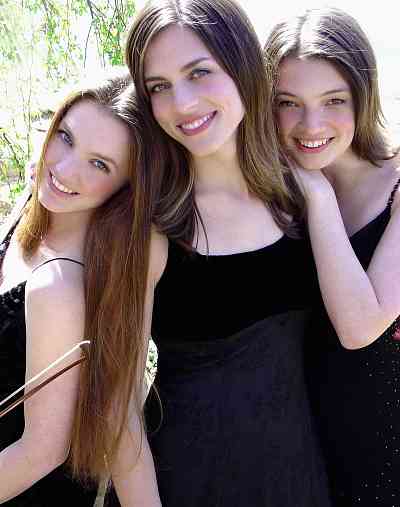
Albers Trio
The Albers Trio (Laura Albers, violin; Julie Albers, cello; Rebecca Albers, viola): From an early age the Albers sisters have been captivating audiences with musical styles as diverse as their distinctive personalities and features. Beginning with their childhood performances on the Pearl Street Mall in Boulder, Colorado the sisters have gone on to perform at such venues as Alice Tully Hall at Lincoln Center, National Theatre in Taipei, Severance Hall, Weill Recital Hall, Wigmore Hall in London, and Zankel Hall. Their performances have also been seen and heard on Live from Lincoln Center, Kennedy Center Honors, Japan’s NHK, Washington D.C.’s Voice of America, and Bavarian Radio. Their upcoming season includes performances in New York City, Boston, California, Colorado, Georgia, Kansas, New Mexico, and Texas.
Violinist Laura Albers is the Associate Concertmaster of the San Francisco Opera. She, as well as her sisters, began studying Suzuki violin with their mother, Ellie LeRoux, at the age of two. Laura went on to receive her Bachelor and Master of Music Degrees from The Cleveland Institute of Music and the Juilliard School, where she studied with Donald Weilerstein and Ronald Copes. She has performed and taught on both violin and viola throughout the United States and in Canada and Mexico. She has also participated in the Cabrillo Festival of Contemporary Music, Rhode Island’s Newport Music Festival, the Sarasota Opera Festival in Florida, and an Orpheus Chamber Orchestra tour. During the Opera’s off-season, Laura enjoys traveling, preparing gourmet meals and racing as an age group triathlete.
Violist Rebecca Albers teaches at the University of Michigan School of Music, Theatre and Dance in Ann Arbor. She received her Bachelor and Master of Music degrees from the Juilliard School, where she was a student and teaching assistant of Heidi Castleman and Hsin-Yun Huang. In addition to the trio, she is a member Mark O’Connor’s Appalachia Waltz Trio and also performs regularly with the Saint Paul Chamber Orchestra, both as a section and principal player. As winner of Juilliard’s 2002-03 viola competition Rebecca made her New York concerto debut performing the New York premiere of Samuel Adler’s Viola Concerto in Alice Tully Hall. She made her European recital debut at the Auditorium du Louvre in Paris. Rebecca has participated in such festivals as the Marlboro Music Festival, Open Chamber Music at Prussia Cove (UK), Bridgehampton Chamber Music Festival, Strings Music Festival, and the Perlman Music Program. Past teachers include Ellie LeRoux and James Maurer.
Cellist Julie Albers studied with Richard Aaron at The Cleveland Institute of Music. She made her major orchestral debut at the age of 17 with the Cleveland Orchestra, and thereafter has performed in recital and with orchestras in the U.S., Europe, Korea, Taiwan, New Zealand, and Australia. Julie has received various awards including the Grand Prize in South Korea’s Gyeongnam International Music Competition and Second Prize in Munich’s Internationaler Musikwettbewerbes der ARD. In America, she has performed with the orchestras of Indianapolis, Seattle, Colorado, Syracuse, San Antonio, Dayton, and San Diego among others. In addition to solo performances, Julie regularly appears at chamber music festivals around the world. Julie is currently in the middle of a three year residency with the Chamber Music Society of Lincoln Center Two. October of 2005 marked the release of her solo debut recording on the Artek Label.
“We feel very fortunate to have grown up immersed in the teachings and ideals of the Suzuki method. Not only did it provide us with an incredible musical foundation, it also empowered each of us at a very early age to feel that we were capable of accomplishing anything we set our minds to. The Suzuki method taught us self discipline and problem solving skills, developed and improved our memory skills, and helped teach us to rejoice not only in our own accomplishments, but also in those of others.”
—Laura, Becca & Julie Albers
Rachel Barton Pine, violin: American violinist Rachel Barton Pine has appeared as soloist with many of the world’s most prestigious orchestras, including the Chicago, Atlanta, St. Louis, Dallas, Baltimore, Montreal, Vienna, New Zealand, and Iceland Symphonies, and the Philadelphia Orchestra, working with conductors including Charles Dutoit, Zubin Mehta, Erich Leinsdorf, Marin Alsop, Neeme Järvi, and Placido Domingo. Acclaimed collaborations include Daniel Barenboim, Christoph Eschenbach, William Warfield, Christopher O’Riley, and Mark O’Connor. Her festival appearances include Ravinia, Marlboro, and Salzburg. She has been featured on St. Paul Sunday, Performance Today, From the Top, CBS Sunday Morning, and NBC’s Today. Her 14 critically acclaimed albums for the Cedille, Dorian, and Cacophony labels include Brahms and Joachim Violin Concertos with Carlos Kalmar and the Chicago Symphony, Scottish Fantasies with the Scottish Chamber Orchestra, and Beethoven and Clement Violin Concertos with José Serebrier and the Royal Philharmonic. She holds top prizes from the J.S. Bach (gold medal), Queen Elisabeth, Paganini, Kreisler, Szigeti, and Montreal international competitions, and has twice been honored as a Chicagoan of the Year. Her charitable activities include serving as a trustee of the Music Institute of Chicago and president of the Rachel Elizabeth Barton Foundation. Rachel plays the Joseph Guarnerius del Gesu (Cremona 1742), known as the “ex-Soldat,” on generous loan from her patron.
Gabriel Bolkosky, violin: Gabriel began Suzuki violin studies at age three. He is presently the executive director of The Phoenix Ensemble, an Ann Arbor, Michigan-based nonprofit arts organization dedicated to helping artists and the educational community. His debut solo album, This and That, was released in 2005 and features both jazz and classical music. Other recordings include explorations of klezmer with Into the Freylakh (The Shape of Klez to Come), of the nuevo tango music of Astor Piazzolla (The Oblivion Project Live), children’s folk music with the children’s-music group Gemini (The Orchestra Is Here to Play), and contemporary music of composers such as Xenakis and Boulez with his former group Non Sequitur (Non Sequitur).
Bolkosky is a sought-after guest artist, performer, and teacher at schools and Suzuki workshops across North America and worldwide. In May 2008, Bolkosky made his debut at Carnegie Hall with Opus 21. In 2008-09, as a member of the Phoenix String Quartet, he was a guest artist in residence at the University of Michigan. He maintains a private studio in Ann Arbor, Michigan. For more information, see www.gabrielbolkosky.com
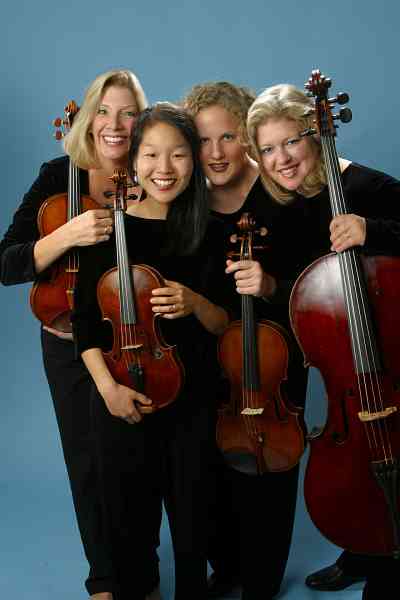
The Cavani Quartet (Annie Fullard, violin; Mari Sato, violin; Kirsten Docter, viola; Merry Peckham, cello): An irresistible presence on stage, the Cavani Quartet concertizes regularly in major series and festivals throughout North America and Europe. Appearances include Carnegie Hall and Alice Tully Hall in New York, the Corcoran Gallery of Art and Kennedy Center in Washington D.C., the Ambassador Series in Los Angeles, Muziekcentrum De Ijsbreker in Amsterdam, Festival de L’Epau in France, and the Honolulu Chamber Music Society. The Cavani Quartet has the honor of being a winner of the prestigious Naumburg Chamber Music Award as well as numerous competitions including Fischoff, Banff, and Coleman. Active proponents of contemporary music, the Quartet has commissioned and performed a worldwide array of living composers and is a recipient of the CMA/ASCAP Award for Adventurous Programming. The Quartet has been featured on National Public Radio’s Performance Today and St. Paul Sunday, NBC, CBS, ABC, and PBS television. In 2005, the Quartet became the first recipient of the Guarneri String Quartet Residency Award from Chamber Music America. Cavani Quartet recordings of Bartók, Dvořák, Schumann, Brahms, Erb, Chausson, Brouwer, and Primosch are available on the Azica, Gasparo, New World, Albany, and Pantheon labels.
The Cavani Quartet has established itself as a dynamic leader in the field of Arts in Education, and has received a number of Chamber Music America Residency Partnership Grants. Nationally acclaimed for their inspiring and innovative teaching and proactive approach to residencies, the Quartet has developed creative programs for audiences of all ages, including a series of children’s concerts for the Chamber Music of Lincoln Center. Formed in 1984, the Cavani Quartet was appointed Quartet-in-Residence at The Cleveland Institute of Music in 1988. The Quartet has also collaborated with artists across disciplines to create programs that unite poetry, painting, theatre, and dance with the string quartet medium, including the award-winning M.A.P. (Music, Art and Poetry) program. In partnership with Southern Illinois University, the Chamber Music Society of Southern Illinois, and the Thomas School String Project, the Quartet has helped to ignite a String Program initiative throughout the state of Illinois. As a result of their extensive experience in chamber music education, the Cavani Quartet was invited to participate as a leadership ensemble in the first national Chamber Music Educator/Ensemble Seminar sponsored by Chamber Music America. The Quartet has been on the Advisory Board of Amateur Chamber Music Players and currently serves on the Honorary Board of the Suzuki Association of the Americas. Visit www.cavani.org for more information.
“The Suzuki Method and philosophy of teaching has always been close to our hearts. Mari and Kirsten are both former “Suzuki kids” and all four of us have children involved in the wonderful Sato Center for Suzuki Studies at The Cleveland Institute of Music. We believe in the philosophy of music as an international language of peace, harmony and the creative spirit. As a quartet, we appreciate a method of teaching which emphasizes kindness, positive reinforcement, thoughtful learning and love for the sheer beauty and power of music.”
—Annie Fullard, Mari Sato, Kirsten Docter & Merry Peckham
Scott Conklin, violin: Violinist Scott Conklin regularly appears as a recitalist, soloist, chamber musician, orchestral player, and clinician throughout the United States and abroad. He is a violin professor at The University of Iowa School of Music and a violin teacher at the Preucil School of Music. Conklin has performed with numerous orchestras including the Louisville, Nashville, and Berlin Symphony Orchestras. He is the 2008 Iowa String Teachers Association Leopold LaFosse Studio Teacher of the Year, and his new album with pianist Alan Huckleberry, Violinguistics—American Voices, is available on Albany Records. Recently, composer Ching-chu Hu wrote and dedicated a new work to Conklin called The Hope Moment for Violin and Piano (2009). Joel Puckett also dedicated a four-movement violin concerto to him called Southern Comforts for violin, orchestral winds, bass, piano, and percussion (2008). During his youth, Conklin studied with Carol Dallinger, Violin Professor at the University of Evansville. He holds a Bachelor of Music degree from The Cleveland Institute of Music, where he studied violin with David Updegraff and chamber music with Peter Salaff. Conklin also earned Master of Music and Doctorate of Musical Arts degrees from The University of Michigan School of Music as a student of Paul Kantor.
“Suzuki nurtures a love for music, humanity, and positivity. As a teacher, musician, and person, the core of Suzuki has been a source of sustenance and inspiration in my development, and it resonates more powerfully over the passage of time.”
—Scott Conklin
Emily Levin, harp: 18-year-old Emily Levin began harp studies under Mary Kay Waddington at the age of five. Soon after, she stated that “not playing the harp would be like not being able to breathe.” From classical works to Argentinean tango music, Emily has a passion for performing for audiences where she is able to share her love of the harp.
Since her 1st place win in the 2003 American Harp Society National Harp Competition, Emily has been a prize winner in every consecutive AHS Competition. She was a featured artist at the USA International Harp Competition Stars of Tomorrow concert and in 2006, was the youngest competitor accepted into the International Harp Contest in Israel. This past summer she performed at the World Harp Congress in Amsterdam as part of the Focus on Youth program. Most recently, she was a Level I winner and Presidential Scholar in the Arts Nominee at the 2009 National Foundation for Advancement in the Arts youngARTS week.
Currently in her 6th season as principal harpist of the Denver Young Artists Orchestra, Emily won the 2006 DYAO Concerto Competition and performed with DYAO in Boettcher Concert Hall. In 2007, she appeared as a guest soloist with the Colorado Young Sinfonia and performed with the Colorado Chamber Players as the recipient of their Young Artist Fellowship. She is a six-year roster member of the Young Musicians Foundation of Colorado.
A senior at Arapahoe High School and a National Merit Finalist, Emily is Student Body Treasurer and the piano accompanist for the Arapahoe Singers. Outside of music, Emily loves reading, history, and biking.
“With the Suzuki approach of learning music by ear, I was able to immediately connect with audiences from a very young age. There was a direct exchange between the music I was playing and the listeners. Without having to focus on reading notes, I could instead devote my energy to sharing music with people. It is this communication with the audience that makes music so profound—regardless of nationality, language, or background, music brings people together through its universal language. Whenever I perform, my goal is to impact the audience through the harp and through the music I play.”
—Emily Levin
Connie Sheu, guitarist: Born and raised in San Jose, CA, Connie earned her Bachelor of Arts in U.S. History and Music from Columbia University where she studied with Antigoni Goni and was awarded a Rapaport Music Fellowship. She is a graduate of The Juilliard School, where she earned her Master of Music in 2006 with Sharon Isbin and was a Morse Teaching Fellow and McCabe Guitar Fellow. Connie is currently pursuing her Doctor of Musical Arts at the University of Southern California under Bill Kanengiser. Her debut solo album, Waking or Sleeping, is now available for purchase at www.conniesheu.com and on iTunes. She teaches privately in Los Angeles. Past performances and teaching engagements have taken her from Carnegie Hall’s Weill Recital Hall, to Florida, Oklahoma, Moldova, Hungary, and throughout California.
“At the age of five, I was given a rare gift. I began Suzuki Guitar lessons at a time when the method for guitar was being pioneered by my first teacher, Frank Longay. Through the Suzuki method, a world of music opened up to me- music that I could listen to, understand, and learn to play quickly. Weekly group classes brought out the joy of music-making in community, and annual concerts brought a sense of pride and accomplishment in the progress I made on the instrument. I never realized until later in life that this kind of early music education was not typical for the average American child. I am grateful for all that I learned as a student of the Suzuki Method and hope that generations to come will benefit from it as well.”
—Connie Sheu
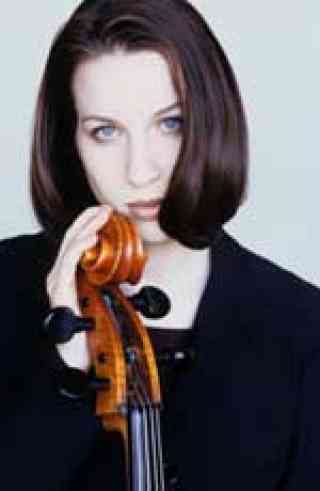
Wendy Warner, cello: Cellist Wendy Warner began studying music at the age of six under the tutelage of Nell Novak. She then studied with Mstislav Rostropovich at the Curtis Institute. Since graduating from Curtis, she has become one of the leading cellists in the world, garnering international attention as the first-prize winner at the 1990 International Rostropovich Competition in Paris, and going on to perform at many of the world’s distinguished concert halls, including Carnegie (NY), Walt Disney Hall (LA), Paris’ Salle Pleyel, and Berlin’s Philharmonie.
Warner has collaborated with leading conductors and has performed with the Chicago, Boston, Dallas, San Francisco, London, Berlin, and Iceland Symphonies, the Minnesota and Philadelphia Orchestras, the St. Petersburg, Calgary, and Hong Kong Philharmonics, Orchestre Symphonique de Quebec, the French Radio Philharmonic Orchestra, and L’Orchestre du Capitole de Toulouse.
Her debut recording of Hindemith’s music for cello and piano (Bridge Records) was followed by a recording featuring duos for cello and violin (Cedille Records). Most recently released is a Naxos recording of the Barber Concerto with the Royal Scottish National Orchestra and Marin Alsop, conductor. A recipient of the prestigious Avery Fisher Career Grant, Warner teaches at Roosevelt University and resides in Chicago.
“I started the cello when I was six years old. My cello teacher, Nell Novak, was a Suzuki teacher. Even though by the time I came to Mrs. Novak, I already knew how to read notes, I would still consider myself a Suzuki child. She incorporated many Suzuki techniques in her teaching. I grew up in the Suzuki world, going to all the Suzuki Conferences around the world. At the Conference in Berlin in 1987 alongside other Suzuki kids, I was chosen to play with the Berlin Symphony. Every summer I looked forward to going to Steven’s Point Wisconsin from the time I was 8 until 14. I experienced so much love and joy sharing music with my teachers and friends. It was like speaking and socializing for me, especially through my experiences playing in the group classes. I felt loved and nurtured. When I was nine years old I was lucky enough to meet Dr. Suzuki in Chicago. On that occasion I played Allegro Appassionato with Orchestra. I remember his generous, giving and nurturing spirit. As a performer, I know in some way, through my playing I am passing on what I have learned through the Suzuki method. Perhaps even more importantly I am passing on what I have learned from the Suzuki method to my young students, with the same love and nurturing spirit that I was given.”
—Wendy Warner
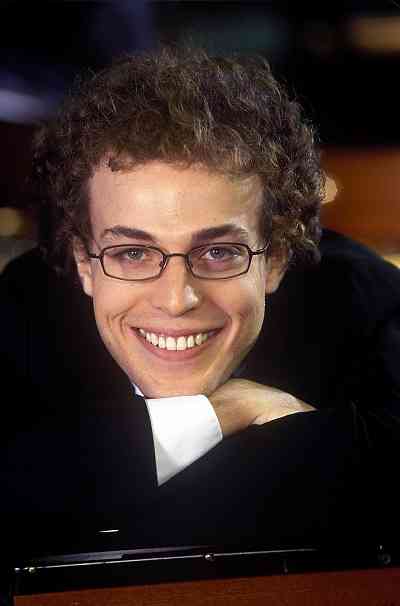
Orion Weiss, piano: A native of Lyndhurst, OH, pianist Orion Weiss attended The Cleveland Institute of Music, where he studied with Paul Schenly. Other teachers include Daniel Shapiro, Sergei Babayan, Kathryn Brown, and Edith Reed. He is one of the most sought-after soloists and collaborators in his generation of young American musicians.
In the past three seasons, he has performed with the Los Angeles Philharmonic, Baltimore Symphony, New World Symphony, Vancouver Symphony, and in duo summer concerts with the New York Philharmonic at both Lincoln Center and the Bravo! Vail Valley Festival. He has also appeared with the symphony orchestras of San Francisco, Houston, Indianapolis, Kansas City, Phoenix, Rochester, Memphis, Albany, Annapolis, Louisville, and Omaha, as well as the Minnesota Orchestra, Pacific Symphony, and Oregon Symphony, among others. In 2005, he toured Israel with the Israel Philharmonic Orchestra conducted by Itzhak Perlman. Highlights of his 2008-09 season include performances with the Orpheus Chamber Orchestra, Pittsburgh Symphony, National Arts Centre Orchestra, and the Detroit Symphony. In spring 2008, he released his debut recording, a recital disc for Yarlung Records including works of Bach, Mozart, Scriabin, and Carter.
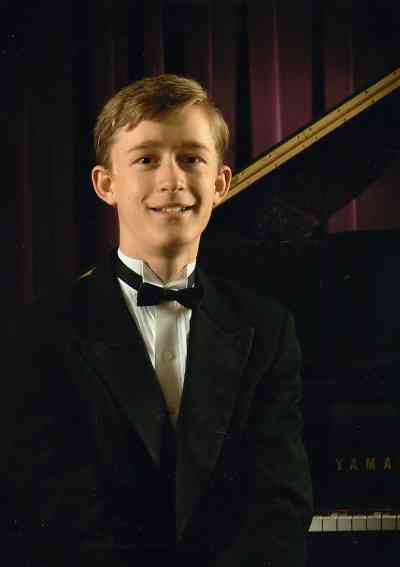
Yale Work, piano: Yale, 19, began Suzuki piano lessons in 1997 and was a student of Crystal Lee in Boulder, Colorado, from 2002 to 2008. During the summer of 2007 he studied with Antoinette Perry at the Aspen Music School.
In the last five years he has won several competitions, including the Wells Music Yamaha Piano Competition (2003, 2006, and 2007), the Boulder Philharmonic Concerto Competition (2006), the Colorado State Music Teachers Association Piano Competition (2003, 2004), and the First Annual Symphony in the Valley Concerto Competition (2004). In October 2007 he was the winner of the Music Teachers National Association (MTNA) Colorado State Piano Competition and subsequently received alternate place at the MTNA regional competition. In April 2008 he won third place in the Missouri Southern International Piano Competition. Also in April 2008 he won first place in his division at the Baker Piano Center Competition and was subsequently named the Grand Prize winner in the run-off stage of that competition. He is a member of the Young Musicians Foundation of Colorado, having won a two-year place on their roster in December 2004, 2006, and 2008. In 2006 he received their Shaak Award for the best piano performance among the pianists selected to be on the YMF roster.
Yale has been a guest soloist three times with the Breckenridge Music Festival Orchestra (2003, 2006, and 2007) and with the Boulder Philharmonic Orchestra (2006). He has also performed in the Young Musicians Foundation showcase concerts.
Yale is a graduate of Bridge School in Boulder, Colorado, and is currently a student of Matti Raekallio in his second year at The Juilliard School.
“Without the Suzuki method, I wouldn’t have had a chance of coming as far as I have. The first stages of learning to play an instrument are some of the most important, and Suzuki’s method for teaching beginner students is, in my opinion, the best there is. In my experience, the main benefit of using this method was the acute sense of hearing that it helped me develop. I believe that a good ear is the most essential aspect of playing any instrument, because the ear is what ultimately determines how a musician plays each piece. The Suzuki method trains the student to listen extremely closely, to recognize differences between different recordings or performances (as well as form opinions about them), to understand how one sonority or one section of a piece relates to the next, to catch and fix the things in the student’s own playing that could sound better, and ultimately to understand and perform music in a more mature, more effective way. I’m convinced that the Suzuki method is the reason that I tested out of all required years of Ear Training here at Juilliard. I also believe it is the reason I find music theory so natural and easy! The Suzuki method was a key factor in making me the musician that I have become.”
—Yale Work
Emily Yaffe, viola: Violist Emily Yaffe, a native of West Hartford, Connecticut, began her music studies as a Suzuki violin student of Teri Einfeldt in the Hartt School Community Division at the age of seven. When she was 14, she began viola study and continued her education under the direction of Victoria Chiang, Mitchell Stern, and Katherine Murdock at Hartt. Emily earned the Bachelor of Music degree from The Juilliard School in May 2002, where she was a student of Heidi Castleman, Misha Amory, and Hsin-Yun Huang. From 2005 to 2008, Emily studied Baroque viola with David Plantier at the Schola Cantorum Basiliensis in Basel, Switzerland. She completed the Fortbildungsstudium there with an Abschlusskonzert in June 2008.
Emily has served on the faculties of the Hartt School Community Division, the Opus 118-Harlem School of Music, and the Lucy Moses School. Since March 2007, Emily has been a member of the Barockorchester Capriccio Basel, which performs regularly in the Basel region and throughout Switzerland. She has also appeared with the Cantus Firmus Barockorchester, the Stadttheater Sursee Orchester, and Die Freitagsakademie. Emily lives with her husband, the double bassist Bret Simner, in Basel, Switzerland.
“For me, the Suzuki method is all about family. As a child, I learned violin with first my father and then my mother as the Suzuki parent. My father accompanied me on the piano for many years of my training (and on this CD as well!). Now, as a Suzuki teacher myself, I ask my mother (also a violinist and teacher) for advice with my own students. The circle is complete when my students share with their parents valuable musical and learning experiences gained through their studies.”
—Emily Yaffe



